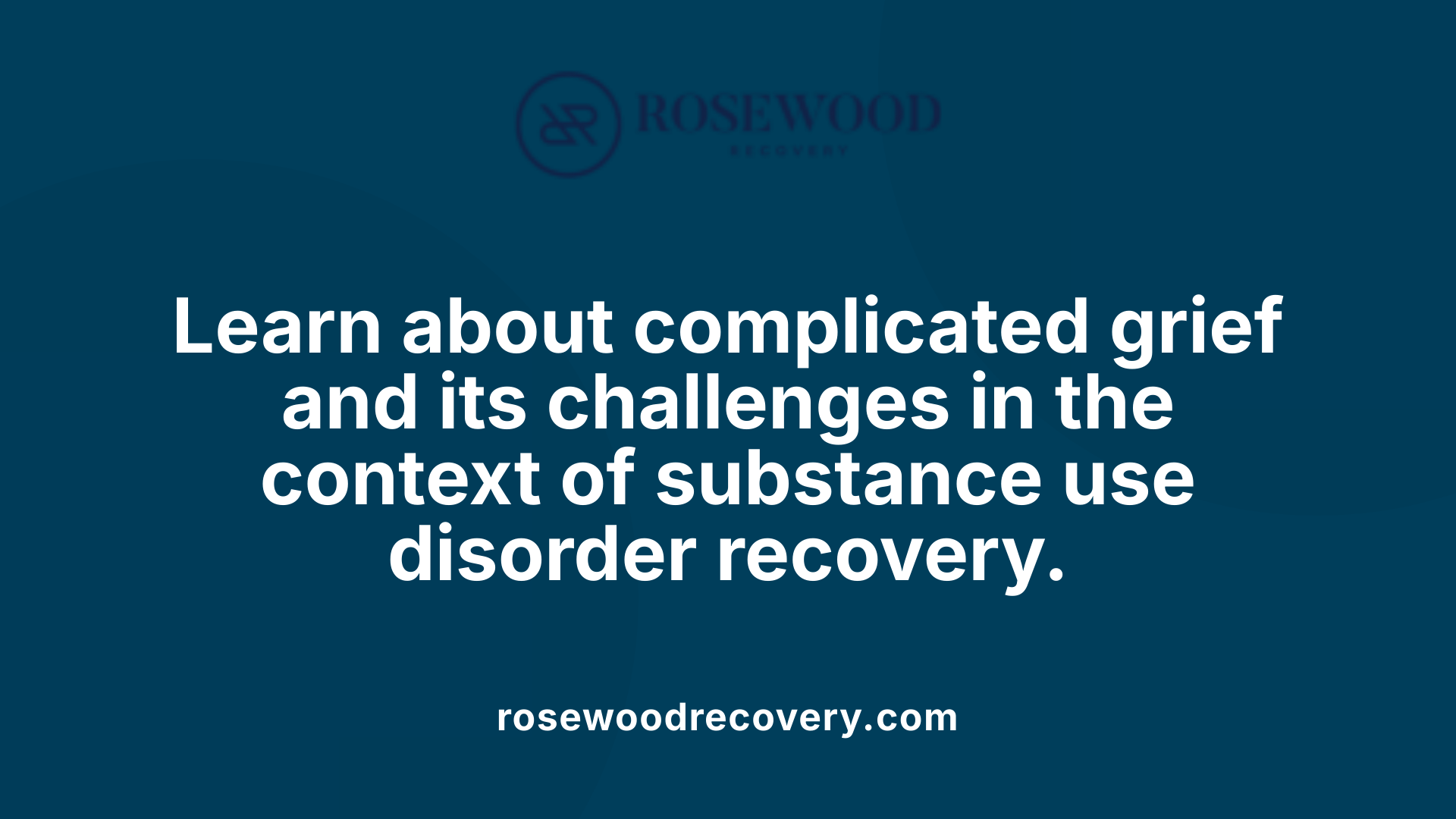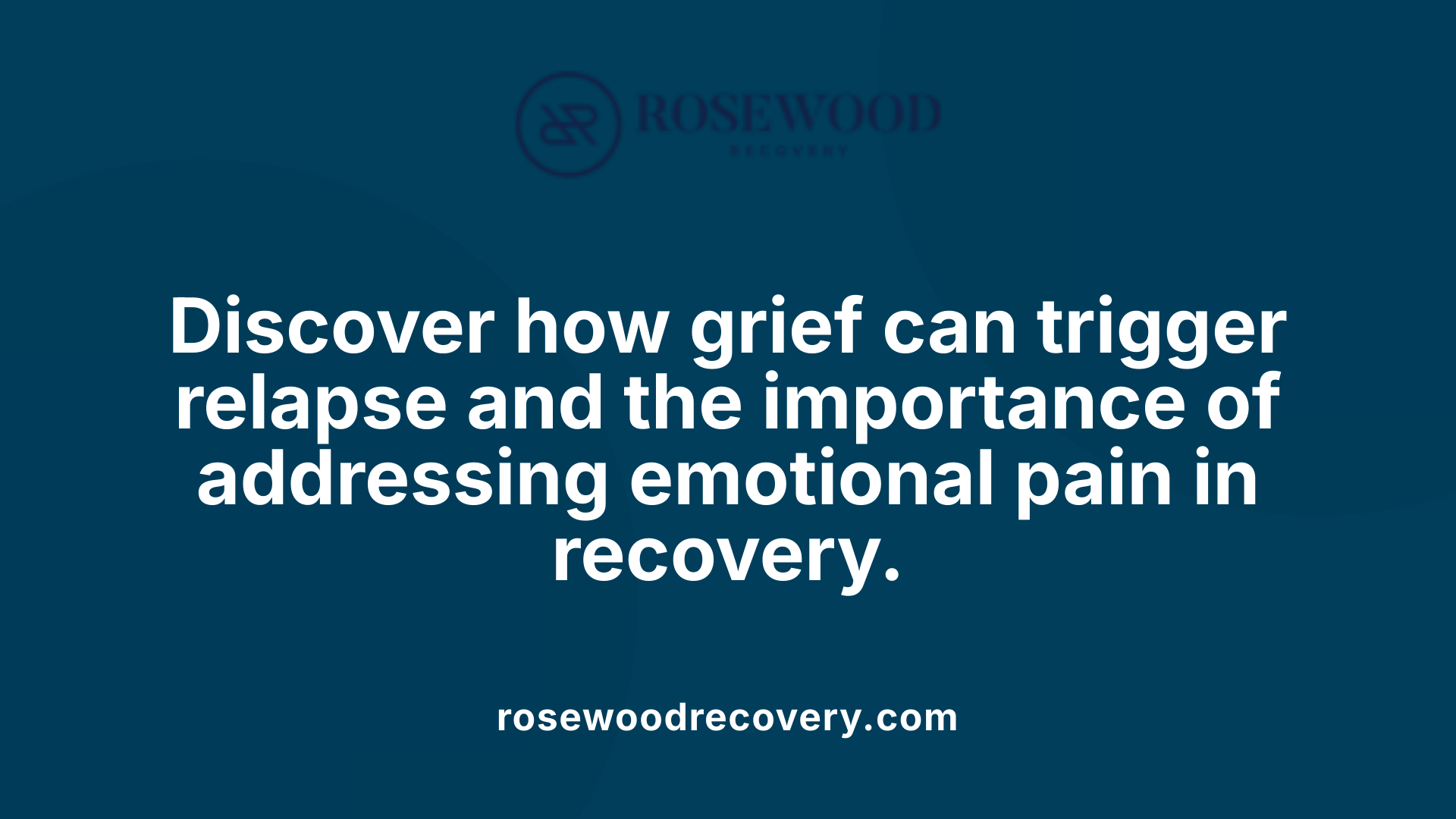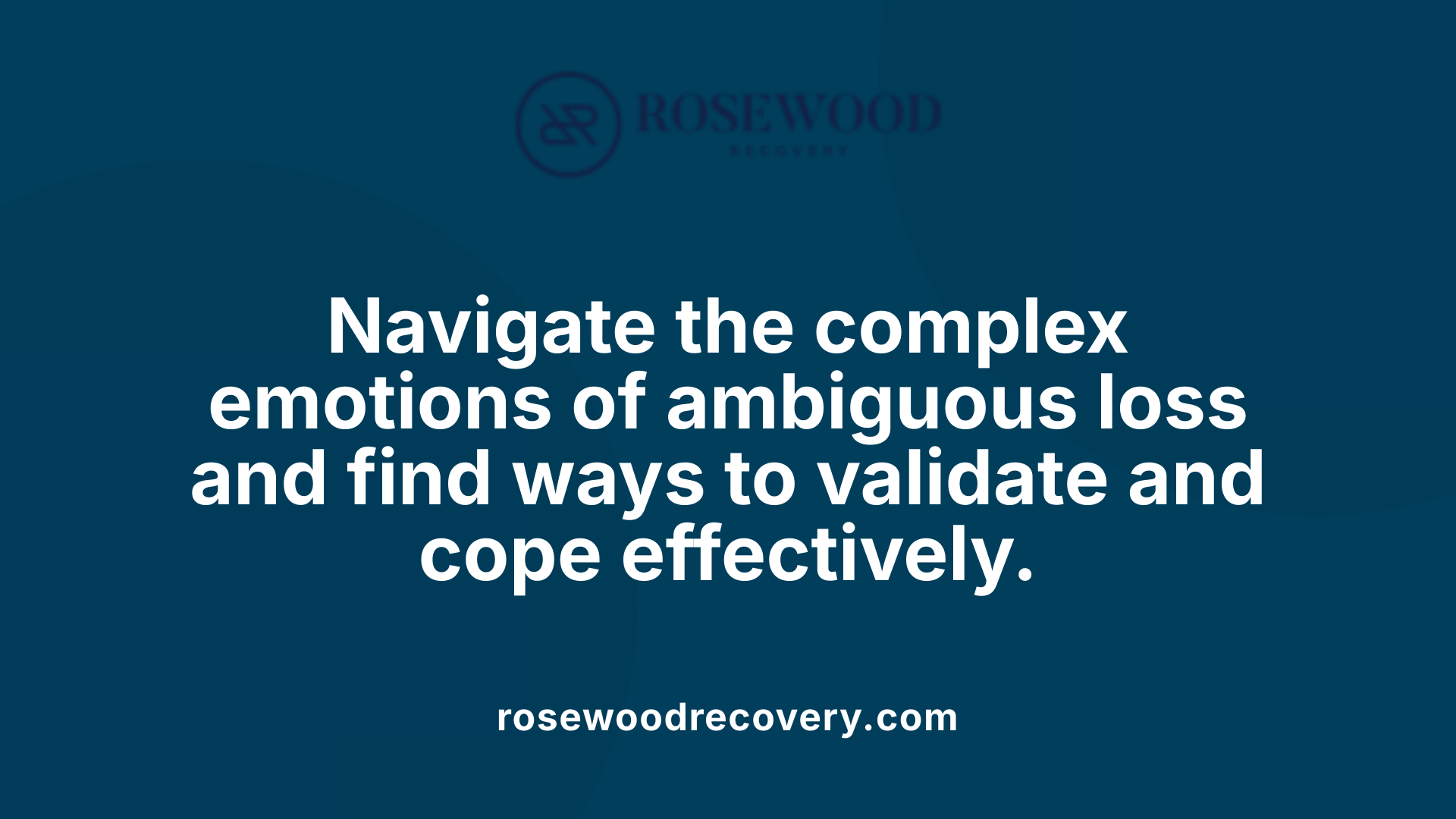Understanding Emotional Grief in the Context of Addiction and Lost Relationships
Grief is an intensely personal and multifaceted emotional experience triggered by loss, especially the loss of significant relationships. When combined with substance use disorders and mental health challenges, grief can become more complicated and harder to navigate. This article explores how to manage emotional grief from lost relationships, particularly focusing on individuals coping with addiction and co-occurring mental health issues. We examine effective treatment approaches, coping strategies, and support systems to promote healing and long-term recovery.
The Nature of Grief: Emotional and Neurological Dimensions

What emotional and physical symptoms characterize grief?
Grief is a complex and deeply personal response to loss, encompassing a wide range of emotions. Individuals may experience sadness, anger, guilt, confusion, relief, anxiety, numbness, helplessness, fatigue, and disruptions in sleep. These varied feelings reveal grief’s multifaceted impact on both mind and body.
How do the stages of grief progress?
Grief unfolds through several stages—denial, anger, bargaining, depression, and acceptance—that are not experienced in a fixed order. People may revisit stages multiple times or feel several emotions simultaneously, reflecting grief's unpredictable nature.
What neurological and hormonal functions are involved in grief?
Neurologically, grief activates specific brain areas including the amygdala, which processes emotions, and the medial prefrontal cortex, involved in regulation and self-reflection. Additionally, grief influences hormone levels like cortisol, associated with stress, and oxytocin, linked to bonding and social connection. These changes contribute to the emotional intensity and physical sensations characteristic of grief.
Understanding these dimensions illuminates why grief affects individuals so profoundly and differently, underscoring the importance of compassionate support and personalized coping strategies during the grieving process.
Complicated Grief and Its Impact on Individuals with Substance Use Disorders

What is Complicated Grief?
Complicated grief (CG) is a persistent and intense emotional response to loss that can deviate from typical bereavement. Unlike ordinary grief, CG may present with atypical symptoms or show a delayed onset. It involves prolonged yearning, distress, and functional impairment, making the grieving process more difficult to manage.
How Common is CG Among Individuals with Substance Use Disorders?
People with substance use disorders (SUD) are especially vulnerable to developing CG following the loss of someone significant. Research indicates that the prevalence of CG does not significantly differ whether the individual's primary substance is alcohol or illicit drugs, although certain coping strategies may vary based on substance type.
What Maladaptive Coping Strategies are Associated with CG?
CG in those with SUD is closely linked to less adaptive coping mechanisms. Emotion-focused responses, including emotional expression, social withdrawal, wishful thinking, and self-criticism, are common but counterproductive. In particular, strategies such as social withdrawal and expressing emotions without constructive channels are considered maladaptive and can contribute to the persistence of CG.
How Does CG Affect Grief Intensity and Recovery in SUD Patients?
The presence of CG intensifies the grief experience, often exacerbating emotional suffering and complicating recovery. CG impairs usual coping processes, potentially leading to poorer outcomes, such as increased relapse risk, and greater vulnerability to overdose or suicide. Consequently, effective interventions focusing on teaching problem-solving and cognitive restructuring are recommended to improve grief outcomes and support sustained recovery in this population.
The Interconnection Between Grief and Addiction: A Vicious Cycle

How Grief Can Trigger Substance Use and Relapse
Grief is a powerful emotional reaction to loss, commonly involving sadness, anger, guilt, and confusion. For individuals recovering from addiction, these intense emotions may undermine their emotional stability. Particularly during the early grief stages—shock, denial, anger, and depression—people are more vulnerable to relapse. These stages impair emotional regulation, making it difficult to cope with the pain and often leading individuals back to substance use as an attempt to self-medicate.
Substance Use as Maladaptive Coping for Grief
Using drugs or alcohol to numb grief-induced emotional suffering is a maladaptive coping mechanism that many people with substance use disorder (SUD) fall into. Substances may temporarily alleviate anxiety and depression triggered by grief, but they do not resolve the underlying emotional turmoil. This avoidance can intensify complicated grief, a chronic and severe form of mourning, thereby extending the distress and negatively affecting recovery.
Risk Factors for Overdose and Suicide During Grief
Those with pre-existing addictions grieving the loss of a significant person face heightened risks, including overdose and suicidal behavior. The overlap of grief and addiction exacerbates emotional pain and can precipitate dangerous choices. Prolonged grief, especially when unresolved, undermines mental health and can lead to despair. This highlights the critical need for supportive interventions during bereavement to reduce harm.
Importance of Addressing Grief in Addiction Recovery
Addressing grief is vital in addiction treatment programs. Integrated approaches that combine grief counseling with addiction therapies help individuals develop healthy coping strategies like problem-solving and cognitive restructuring. Therapeutic modalities such as group counseling, holistic practices, and aftercare support foster emotional resilience. Processing grief healthily promotes sustained sobriety, helping individuals transition toward acceptance, hope, and recovery. Failure to address grief may perpetuate relapse and complicate recovery journeys.
Comprehensive Treatment Options for Substance Abuse and Co-Occurring Mental Health Issues
What are the comprehensive treatment options available for substance abuse?
Treating substance use disorder (SUD) involves a combination of detoxification and various behavioral therapies tailored to individual needs. Detoxification is typically the first step, clearing substances from the body under medical supervision to safely manage withdrawal symptoms.
Behavioral therapies such as Cognitive Behavioral Therapy (CBT) and motivational interviewing are core to addressing the psychological components of addiction. CBT helps patients identify and change harmful thought patterns and behaviors, while motivational interviewing enhances motivation for positive behavioral change. Additionally, Medication-Assisted Treatments (MAT), including drugs like methadone and naltrexone, are used to reduce cravings and withdrawal symptoms, increasing chances of sustained recovery.
Outpatient and inpatient rehabilitation programs offer structured environments with comprehensive care, combining therapy sessions and medical monitoring. Support groups, including Narcotics Anonymous, provide peer support and community connection, essential for maintaining sobriety. Aftercare programs further aid recovery by offering continued counseling and relapse prevention strategies.
How do treatment services address co-occurring mental health issues alongside addiction?
Integrated care models are designed to simultaneously treat both addiction and co-occurring mental health disorders. These models start with comprehensive assessments to accurately diagnose all presenting issues, ensuring personalized treatment plans.
Therapies such as Dialectical Behavior Therapy (DBT) and CBT are often adapted to address the unique challenges of dual diagnoses. These approaches are combined with appropriate psychiatric medications when needed, helping to manage symptoms of depression, anxiety, or other mental health conditions alongside substance use.
Treatment services coordinate across multiple settings—from detox units to outpatient clinics—providing consistent and cohesive care. Support groups tailored for individuals facing both addiction and mental health challenges offer peer understanding and reduce isolation.
This holistic approach emphasizes addressing emotional and psychological aspects, which is crucial because unresolved mental health struggles can hinder addiction recovery. Personalized, integrated care improves outcomes by promoting long-term sobriety and emotional resilience.
Counseling’s Crucial Role in Healing Grief and Addiction
What role does counseling play in the treatment of addiction and mental health issues?
Counseling serves as a cornerstone in addressing both addiction and grief-related mental health challenges. Through individual and group therapy sessions, clients gain a deeper understanding of the emotional pain behind their substance use and complicated grief.
Therapists help clients build effective coping strategies that replace maladaptive behaviors like emotional withdrawal and wishful thinking with healthier approaches such as problem-solving and cognitive restructuring. This guidance strengthens motivation to maintain sobriety and manage grief healthily.
A crucial part of counseling involves relapse prevention planning. Counselors work with individuals to identify triggers—such as grief stages like denial and anger—that might prompt a return to substance use, then develop concrete strategies to manage these risks.
Family engagement is often encouraged, offering education to help loved ones support recovery and understand the emotional complexities involved. Additionally, counselors connect clients to community support groups and resources, fostering a network that empowers sustained healing and addresses grief beyond therapy sessions.
These integrated therapeutic methods promote emotional resilience, enabling individuals to move toward acceptance, hope, and long-term recovery from addiction and grief.
Adaptive Versus Maladaptive Coping Strategies in Grief Management
What Are Emotion-Focused Coping and How Do They Affect Grief in SUD Patients?
Emotion-focused coping involves strategies that center on expressing and managing emotional responses rather than directly addressing the problem. Research shows that patients with substance use disorder (SUD) who experience complicated grief (CG) often rely on emotion-focused approaches like emotional expression, social withdrawal, wishful thinking, and self-criticism. While these methods might provide short-term relief, they are typically maladaptive and correlate with worsened grief outcomes.
How Do Social Withdrawal and Emotional Expression Relate to Complicated Grief?
Social withdrawal and emotional expression are two emotion-focused coping behaviors observed in individuals with complicated grief. Although expressing emotions can sometimes be helpful, excessive or unstructured emotional expression paired with withdrawal from social supports may deepen feelings of isolation and prolong grief. This pattern is frequently seen in SUD patients with CG, highlighting the risk that these strategies can interfere with healthy mourning and recovery.
Why Promote Problem-Solving and Cognitive Restructuring in Treatment?
Problem-solving and cognitive restructuring are adaptive coping strategies that help individuals actively manage grief by identifying challenges and reframing negative thoughts about loss. Training SUD patients in these skills can foster healthier emotional regulation, reduce maladaptive behaviors, and improve overall grief recovery. Treatment settings that incorporate these strategies encourage patients to tackle grief-related difficulties constructively, which supports both their emotional well-being and addiction recovery.
Integrating Effective Coping in Treatment
Encouraging problem-solving, cognitive restructuring, and other adaptive techniques forms an important part of integrated care for SUD patients experiencing grief. Providers can facilitate this by offering counseling, skill-building workshops, and peer support groups focused on practical grief management. Such interventions aim to reduce reliance on maladaptive, emotion-focused strategies and promote resilience through healthier coping mechanisms.
Understanding Ambiguous Loss: Grieving Without Closure

What are the types of ambiguous loss and what emotions do they bring?
Ambiguous loss occurs when the loss isn't clearly defined by death but involves emotional or physical disconnection. There are three main types:
- Goodbye without leaving: Situations like divorce, estrangement, or dementia where the person is physically present but psychologically absent.
- Leaving without a goodbye: Instances like missing persons or abandonment linked to addiction where closure is never attained.
- Situational goodbye: Losses from natural disasters or political unrest where the outcome or reunion is uncertain.
These scenarios often trigger intense and complex emotions such as sorrow, numbness, bitterness, persistent longing, pain, rumination, guilt, and anger, reflecting the ambiguous nature of the loss.
How can individuals validate their experience of ambiguous loss?
Validating the loss is an essential step toward emotional healing. One effective method is to acknowledge the changes by listing and writing down what has been lost or altered in life. Sharing this list with trusted friends, family members, or counselors helps externalize feelings and confirms that these experiences are real and worthy of attention.
What ceremonial and ritualistic coping strategies help manage ambiguous loss?
Though ambiguous loss lacks traditional closure, ceremonial acts can offer meaningful ways to process grief, such as:
- Writing letters to the lost person
- Planting trees or flowers in their honor
- Making donations or contributions in their memory
- Holding remembrance ceremonies
These rituals provide structure and symbolic expression that can ease feelings of unresolved grief.
Why is social and professional support important in coping with ambiguous loss?
Support networks including family, friends, social groups, faith communities, and mental health professionals play a vital role. They offer emotional understanding, create safe spaces for sharing, and provide guidance to navigate complicated feelings. Professional counselors can assist in managing symptoms and developing coping strategies tailored to ambiguous loss.
| Aspect | Description | Examples/Notes |
|---|---|---|
| Types of Ambiguous Loss | Emotional or physical disconnection without clear closure | Divorce, missing persons, natural disasters |
| Emotions Experienced | Sorrow, numbness, bitterness, longing, guilt, anger | Complex and simultaneous feelings |
| Validation Techniques | Writing down changes, sharing feelings | Helps acknowledge and legitimize the loss |
| Ritualistic Coping | Letters, planting trees, remembrance ceremonies | Symbolic acts aiding emotional processing |
| Support Systems | Family, friends, faith communities, professionals | Crucial for emotional support and guidance |
The Role of Community, Support Systems, and Aftercare in Grief and Recovery

The Importance of Family, Friends, Faith Communities, and Peer Groups
Support from close connections such as family, friends, faith communities, and peer groups plays an essential role in coping with grief and sustaining recovery from addiction. These networks offer emotional comfort and understanding, helping individuals feel less isolated during difficult times. They can provide a sense of belonging and shared experience, crucial for navigating complex emotions linked to loss and substance use disorders.
Structured Aftercare and Relapse Prevention Services
Aftercare programs and relapse prevention services are critical components of a comprehensive recovery plan. They assist individuals in maintaining sobriety while managing grief effectively. Structured support through counseling, group therapy, and regular check-ins helps identify and address triggers early, reducing the risk of relapse. These services also focus on building coping skills tailored to the unique challenges of grief intertwined with addiction.
Holistic Therapies like Yoga and Meditation
Holistic approaches such as yoga and meditation are increasingly recognized for their benefits in supporting grief processing and emotional regulation. These therapies promote mindfulness, reduce stress, and enhance emotional resilience. Integrating such practices into recovery routines can complement traditional treatments by fostering calmness and improving overall well-being.
Long-term Maintenance of Emotional Resilience
Sustaining recovery and healthy grief adaptations over the long term involves continuous emotional resilience building. This includes ongoing engagement with support networks, participation in aftercare, and practicing self-care techniques. Emotional resilience equips individuals to face future losses or stressors without resorting to substance use, supporting sustained sobriety and psychological health.
In sum, community support and structured aftercare enriched with holistic therapies contribute significantly to the recovery journey. They help individuals manage grief constructively and maintain emotional strength, essential for long-term success.
Recognizing and Treating Prolonged Grief Disorder (PGD) Within Addiction Treatment
What is Prolonged Grief Disorder (PGD)?
Prolonged Grief Disorder is a mental health condition characterized by intense, persistent yearning and distress related to the loss of a loved one. Symptoms last more than one year in adults and six months in children, causing significant impairment in daily functioning. Unlike normal grief, PGD involves a chronic, intense emotional state that goes beyond typical mourning.
Why is Differentiating PGD from Normal Grief Clinically Important?
Distinguishing PGD from normal grief is crucial because PGD requires targeted clinical intervention. While normal grief fluctuates and gradually improves, PGD persists and can hinder psychological and emotional recovery. In individuals with substance use disorder (SUD), untreated PGD can exacerbate addiction symptoms and increase risks such as relapse, overdose, or suicide.
Effective Treatment Modalities for PGD
Treatment for PGD often includes cognitive-behavioral therapy (CBT) approaches focusing on problem-solving and cognitive restructuring. These help patients develop adaptive coping mechanisms rather than maladaptive ones like social withdrawal and wishful thinking, commonly seen in SUD patients suffering from complicated grief. Integrated treatment plans incorporating individual counseling, group therapy, holistic methods (e.g., meditation, yoga), and support systems improve both grief and addiction outcomes.
How Does PGD Impact Addiction Recovery?
PGD can significantly impair an individual's ability to recover from addiction. Unresolved grief triggers emotional dysregulation, increasing vulnerability to relapse, especially during early grief stages like denial and anger. Addressing PGD with tailored grief interventions supports emotional resilience, promotes long-term sobriety, and improves overall well-being by reducing chronic emotional suffering and enhancing coping capacity.
Moving Forward: Healing and Hope Beyond Loss
Managing emotional grief from lost relationships requires a compassionate and multi-dimensional approach, especially for individuals struggling with addiction and mental health challenges. Understanding the complexity of grief, recognizing the risks of complicated grief, and employing comprehensive treatment strategies that integrate addiction and mental health care are essential. Counseling, adaptive coping methods, and robust support systems empower individuals to process loss constructively, reduce the risk of relapse, and rebuild meaningful lives. While grief may never fully disappear, moving toward acceptance, hope, and emotional resilience allows individuals to honor their losses and embrace recovery with renewed strength.
References
- Coping Strategies and Complicated Grief in a Substance ...
- Navigating grief and loss as a result of substance use
- Coping with Bereavement and Grief
- Grief and addiction | Mental Health
- The Relationship Between Grief and Addiction
- Unnamed pain: Coping with ambiguous loss
- The Role of the Substance Abuse Counselor in Addiction ...
- Roles and Responsibilities of an Addiction Counselor




